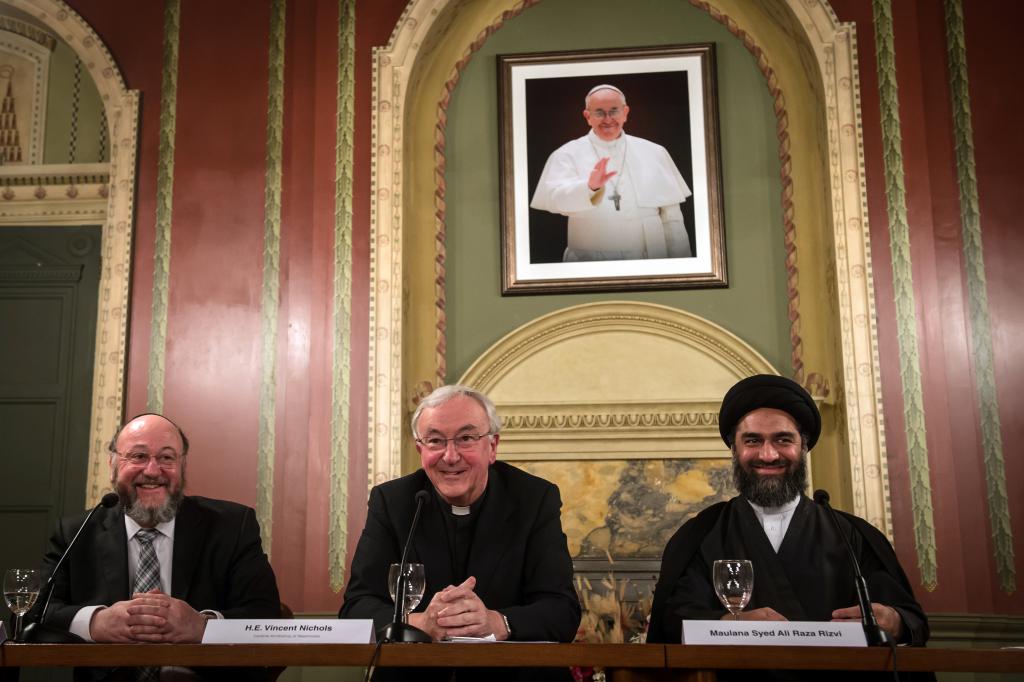On Tuesday 8 March Cardinal Vincent hosted the annual Pope Benedict XVI lecture at Archbishop’s House. He was joined by Chief Rabbi Ephraim Mirvis and Maulana Syed Ali Raza Rizvi who discussed the theme: ‘Living as a creative minority in the UK.’
In his address, the Chief Rabbi began by focusing on the first Biblical account of a creative minority: the Hebrews in Egypt. He recounted the story of Joseph, who integrated himself into Egyptian society, and contributed his talents and abilities with others.
He went on to outline two conditions needed for creative minorities to flourish within our society. The first, he explained, relates to the host society. ‘Society must provide opportunities for minorities to flourish, to grow and to develop. They must give self-confidence to those minorities to enable them to bring the best out of themselves, not only for their own sakes but for the sake of all of society.’
Explaining the second condition, he recalled the blessing that Jacob gave to Ephraim and Manasseh: ‘May the angel who has redeemed me from all evil bless these lads and may they be called after my name and the name of my father and grandfather, Isaac and Abraham, and may they prosper and expand in the midst of the land.’ Jacob delivers a dual imperative to ‘be proud of where you come from, be true to your faith…believe in God and follow him loyally.’ He went on: ‘but in terms of society, you will be a part of your society…integrate but don’t assimilate’.
The Chief Rabbi concluded by stating that society and minorities have a responsibility. Society must ‘recognise and empower minorities’, whilst minorities must grasp opportunities to grow and flourish. They should not make excuses, but to ‘utilise every possible opportunity to work hard and diligently in order to provide a contribution of great value to our societies’.
Following the Chief Rabbi, Maulana Syed Ali Raza Rizvi opened his address by quoting from the Qur’an at the creation of mankind. We may be from different groups or races, but ‘we belong to one father and one mother: Adam and Eve’. He continued, saying: ‘We are all men created by God, hence we should not be proud and arrogant sometimes of our identities, but should be contributing to the wider community. Everyone is either your brother in faith or your equal in humanity, and that’s what we strongly believe in.’
He focused on the importance of community building, recognising that the Muslim population in the UK is very young in comparison to the Jewish and Catholic communities. Maulana Rizvi explained that, as a minority, they must contribute to the wider community: ‘Many times we underestimate our own abilities and our contributions to the larger society.’
Although recognising that there is much to be learnt, since the Muslim community is still young in comparison to other minorities in the UK, Maulana Rizvi explained: ‘I feel that London has more Islamic values than many of the Muslim countries put together. Many Muslims say it is unfortunate, and it is. But there are many different communities living together in peace and harmony, giving respect to the others, and loving others. And that is what Islam is all about.’
In the final formal address, Cardinal Vincent began by reflecting on the recent service of Vespers celebrated at Hampton Court Palace. The Catholic Church became a minority during the Reformation, and was not re-established in society until 1850. He explained: ‘Our journey from that time, as a religious minority, has been remarkable, meeting both hostility and friendship…while staying faithful to our central beliefs and teaching.’
Education was at the heart of this journey; it was decided that ‘before any church building was to be constructed, a school was to be established. The school, said the bishops, would form and support the living stones of the Church.’
He recalled Pope Benedict XVI’s speech given in Westminster Hall, in which the Pope argued that there is a complementarity of faith and reason in addressing the challenge of ‘What are the requirements that governments may reasonably impose upon citizens, and how far do they extend? By appeal to what authority can moral dilemmas be resolved?’ Education is a place where this dialogue between faith and rationality can take place: ‘In our task of integration, knowing that in Britain today we have a truly respectful, pluralist society, sound and lasting education is an important pathway.’




